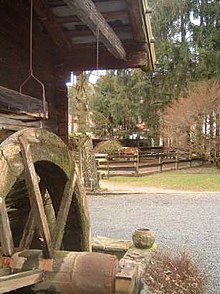Krölls Mill
The Krölls-Mühle or “ Herrschaftlich- Kurkölnische Bannmühle” is located in the Fockenbachtal on the outskirts of Niederbreitbach in the Westerwald , Rhineland-Palatinate ( Germany ).
The Krölls-Mühle drew its water mainly from the Fockenbach, a tributary of the Wied , and a stream from the adjacent Kerbtal. In addition to the main timber-framed building, the Krölls-Mühle ensemble includes the actual mill, a barn and a few stables.
history
The oldest known source in which the spell mill in Niederbreitbach is mentioned dates back to 1644. As "herrschaftlich- Electorate of Cologne spell mill" it has long been owned by the Counts Elector or have been, and was operated by renters. When the mill was built is still not finally known. According to another source, however, it must have existed before 1630, as a tenant in the 17th century asked the prince for a renovation permit, as the mill would have suffered considerably in the Thirty Years War. The architecture of the half-timbering is divided into two parts, so that the main mill building may have been built in two construction phases in different epochs.
The name "Krölls-Mühle", which is common today, is based on the name of the first "private" owner of the mill, who acquired it in 1850 from Prince zu Wied. Several generations of the Kröll family lived in the mill. The First World War put an end to the mill operation. The mill was deprived of its original function. In 1958 a Neuwied merchant acquired the half-ruined mill and converted it into a weekend house.
In the 1970s, a pioneer unit of the Bundeswehr built a flood-resistant bridge over the Fockenbach. Until then, the owners had to drive through a ford to the mill and were cut off from the outside world during floods. Today it is the last mill still in existence in Niederbreitbach with a mill wheel (rebuilt in the late 1980s) and a grain mill in a separate building. Most of the mill moat is still there and water flows through it. Only part of the upper course from Fockenbach to Fockenbachstrasse can no longer be seen today. For many years, the water supply for Niederbreitbach was located at the Mühlenhof. However, the pump and water storage building was recently demolished and the site renatured.
Brief summary of the tenants:
- 1644 Jacob Stein (Steiner?) Von der Scheidtmühle for six years
- 1649 Wilhelm Steiner, brother of Jacob Steiner, † 1676
- 1676 Jacob Steiner
- 1742 Hermann Scheidt, † 1754
- 1755 Lease for 12 years to the widow Scheidt for her sons Matthias and Anton
- 1790 Lorenz Bohr, son-in-law of Matthias Scheidt
- End of 1790 Hüttenmeister (Clemenshütte) Sahler
- 1811 Bohr family
- 1827 Lux and Sahler, lease goes to Hermann Kröll von Oberelsaff, then
- until 1845 Cölestin Prangenberg
- 1845 Wilhelm Siebenmorgen to 1850
Private owner:
- 1850 Johannes Kröll
- 1882 Takeover of the mill by his son
- 1958 Franz Xaver Vogl
- 1959 Erika and Herbert Hillmert
- 1983 Hans-Jürgen and Gerhard Hillmert
- 1986 Hannelore Güde
- 2006 Esther and Thomas Lingen
present
The stately Bannmühle or Krölls-Mühle today has an overshot mill wheel with a grain mill. However, the mill is no longer in its original location in the old mill building, but was rebuilt in an outbuilding. Since the mill is privately owned, a view of the mill is only possible from the Fockenbachtal hiking trail. If you are interested, the owners allow you to look into the grain mill. The Kröllsmühle is currently also a riding stables with 11 horses.
swell
- Albert Hardt: In the land of Neuerburg an der Wied . Neuwieder Verlagsgesellschaft, 1987.
- A journey through pictures into the past . Illustrated book about Niederbreitbach, October 8, 2004.
Coordinates: 50 ° 31 '54.1 " N , 7 ° 25' 42.2" E


